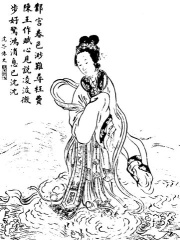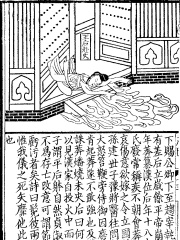


The Most Famous
COMPANIONS from China
This page contains a list of the greatest Chinese Companions. The pantheon dataset contains 784 Companions, 3 of which were born in China. This makes China the birth place of the 32nd most number of Companions behind Serbia, and Norway.
Top 3
The following people are considered by Pantheon to be the most legendary Chinese Companions of all time. This list of famous Chinese Companions is sorted by HPI (Historical Popularity Index), a metric that aggregates information on a biography's online popularity.

1. Princess Taiping (665 - 713)
With an HPI of 66.68, Princess Taiping is the most famous Chinese Companion. Her biography has been translated into 17 different languages on wikipedia.
Princess Taiping (Chinese: 太平公主; pinyin: Tàipíng Gōngzhǔ; literally "Princess of Great Peace"; born after 662 – died August 2, 713) was a member of the Tang imperial family and a political figure active during the reigns of her mother Wu Zetian, and her brothers Emperor Zhongzong and Emperor Ruizong (both of whom reigned twice), particularly during Emperor Ruizong's second reign, when for three years until her death, she was the real power behind the throne.Her personal name is not recorded in official histories, though some later sources suggest it may have been Li Lingyue (李令月). She played a significant role in court politics during a period of dynastic transition, including the restoration of the Tang dynasty following Wu Zetian’s abdication. Princess Taiping was involved in the 705 coup that reinstated Emperor Zhongzong and later supported the 710 purge of Empress Wei’s faction. During Emperor Ruizong’s second reign (710–712), she held considerable influence over state affairs and was regarded as a key figure in the administration. Following Emperor Ruizong’s abdication in favor of his son Li Longji (later Emperor Xuanzong) in 712, tensions between Princess Taiping and the new emperor escalated. In 713, according to historical records, believing that she was planning to overthrow him, acted first, executing a large number of her powerful allies and forcing her to commit suicide.

2. Lady Zhen (183 - 221)
With an HPI of 66.13, Lady Zhen is the 2nd most famous Chinese Companion. Her biography has been translated into 17 different languages.
Lady Zhen (26 January 183 – 4 August 221), personal name unknown, was the first wife of Cao Pi, the first ruler of the state of Cao Wei in the Three Kingdoms period. In 226, she was posthumously honoured as Empress Wenzhao when her son Cao Rui succeeded Cao Pi as the emperor of Wei.

3. Empress Wang (Ping) (8 BC - 23)
With an HPI of 59.83, Empress Wang (Ping) is the 3rd most famous Chinese Companion. Her biography has been translated into 15 different languages.
Empress Wang (王皇后)(8 BC – 5 October 23 AD), formally Empress Xiaoping (孝平皇后), formally during her father Wang Mang's Xin dynasty Duchess Dowager of Ding'an (定安太后) then Princess Huanghuang (黃皇室主), was an empress during the Han dynasty and the last empress of the Western Han dynasty. She was the daughter of the eventual usurper Wang Mang, who established the Xin dynasty. Her husband was Emperor Ping. She is largely viewed by historians as a tragic figure, the victim of circumstances who tried to remain loyal to her husband of only a few years, but whose faithfulness to her husband's dynasty eventually led her to commit suicide at the end of her father's reign.
People
Pantheon has 3 people classified as Chinese companions born between 8 BC and 665. Of these 3, none of them are still alive today. The most famous deceased Chinese companions include Princess Taiping, Lady Zhen, and Empress Wang (Ping).
Deceased Chinese Companions
Go to all RankingsPrincess Taiping
665 - 713
HPI: 66.68
Lady Zhen
183 - 221
HPI: 66.13
Empress Wang (Ping)
8 BC - 23
HPI: 59.83

